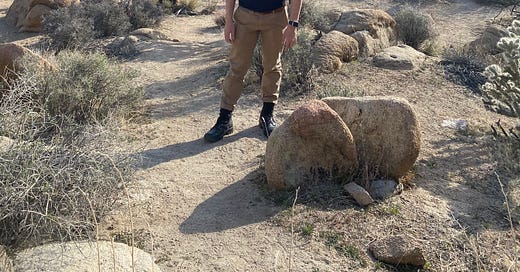Apperceptive Mess #6: Rocks and Bushes, Wealth-Fasting, and Embracing Nonsensical Ideas
Hello friends!
I just got back from Joshua Tree National Park, marking my first national park visit since being back in the US! I have always liked the idea of jumping in a car and spontaneously exploring an area unbounded by “destination”; and this was the first time in my life I really got to do that!
Growing up in Singapore where land is scarce, being able to experience nature outside the country at its fullest has been a thing I have learned to not take for granted.
I have to admit, though: I haven’t always been a huge fan of the desert nor understood why the “Australian bush” is a tourist attraction. But after Joshua Tree, I think it might be starting to grow on me.
Please enjoy this photo of me, posing among the rocks and bushes. To Ferris, my trainer: sorry, I know you told me to stop leaning on my left leg whenever I’m standing.

Conversation of The Week: ???
My apologies: dropped the ball on this one. No conversation this week :(
Meditation of The Week: Camping as Wealth-Fasting
My relationship with nature has always been an examination of my adaptability as an individual: from traversing the glacial caves in Iceland to the climbing of a snow-capped Lassen Peak, being in close contact with nature brings me close to my individual self.
The quality of the exercise isn’t really one that takes place on a physical dimension, but weighs heavily on psychological: nature’s beauty is that it is neutral to us all. Regardless of our identity in any dimension (social, economic, gender), we fear natural disasters all the same.
Unlike other settings of competition where there can inevitably be a situation where involved parties withhold information considered advantageous to their self-interests, nature is circumstantially equal for all. Your chances of survival is only as equal to the level of preparation you have and the system you will fall back on given moments of crisis.
In Letter 18 of Seneca’s letters to his friend Lucilius, he challenges:
Set aside now and then a number of days which you will be content with the plainest of food, and very little of it, and with rough, coarse clothing, and will ask yourself, ‘Is this what one used to dread?’ It is in times of security that the spirit should be preparing itself to deal with difficult times; while fortune is bestowing favours on it then is the time for it to be strengthened against her rebuffs.
Growing up privileged, exposing myself to camping was always the closest simulation of being able to experience a life without the defaults: artificial light, cell signal, electronic maps, sanitation facilities, etc.
Using 3-4 days to occasionally throw myself outdoors stimulates the part of my brain that forces me to cultivate a mindset of paranoia and resourcefulness: to be reminded to never take anything for granted, that I need to always be ready to fight to get my way through the world, and to protect everything that I have.
There is an undeniably rehabilitative quality that comes with being away from artificial light, building a fire, making food with minimal tools, and reducing your day-to-day conditions to necessity.
Read of The Week: The 11 rules of succeeding with nonsensical ideas
Not usually a huge fan of listicles, but had to share some favourite ideas mentioned in this one by Ogilvy legend Rory Sutherland:
1. One Outlier > 10 Average Users. Most problem-solving models generate solutions with completely average characteristics for a non-existent individual. Focus on the niche, and make your way into the mainstream.
2. Be aware of models that social and competitive environments cast in our brains. These environments almost always further the depth of moat shaped by dogmatic thought. When everybody shares the same playbook, you invariably ensure that playing the same game will put you at the same place as everyone else; where you’re made to share a market space on a race to the bottom. To be distinguished, figure out the playbook everyone else has, find where their use of it is too narrow, and exploit it.
3. Be comfortable with progress from happy accidents. Do not let methodological purity restrict number of solutions you can produce.
4. Ask questions that make you sound stupid. Because they are usually the questions that no one has dared ask, making them more likely to lead to unique answers/solutions
Quote of The Week
The progress of a society is not only measured in terms of its speed, the standards of its smart or rich people, or what is good for the young. It must also take account of the elderly and others who feel left behind, and consider their happiness.
That is all we have for the week! I hope you enjoyed reading this as much as I did writing it.

If you have any questions/suggestions/complaints/feedback, please feel free to reach out and let’s learn together.
If you liked this newsletter, be sure to share it with your friends.


